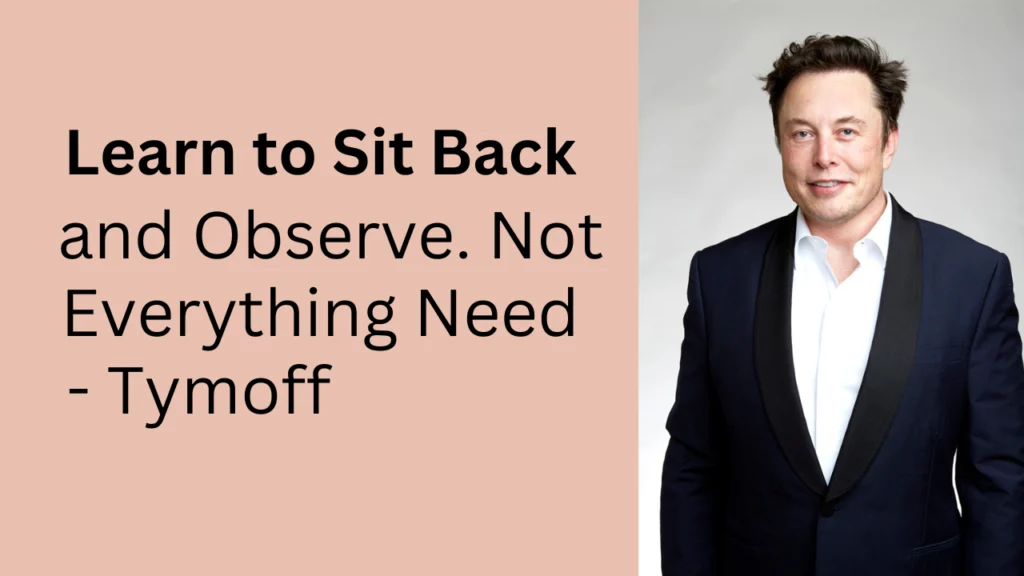In today’s fast-paced world, the ability to pause and observe rather than react instantly can be a valuable skill. “Learn to sit back and watch. Not everything needs an answer,” the quote attributed to Tymoff is a reminder of the importance of mindfulness and patience in our daily lives. This article explores the benefits of adopting a more perspective stance and how we can increase the ability to understand and decide.
The Importance of Observation
Observing the environment allows us to better understand the environment. With time, we can gather more information, which helps us make better decisions. This skill is especially useful in difficult situations where a quick response can lead to mistakes or misunderstandings.
Key Points:
Improved understanding: Observation gives you a clearer understanding of the development of situations and details.
Better decision making: The more information you have, the better decision you can make.
Reduces stress: Reacting thoughtlessly can cause stress and anxiety. Observation helps reduce these feelings by giving you more control over your reactions.
Observational Skills in Everyday Life
Analytical skills can be useful in a variety of aspects of daily life, from personal relationships to professional settings.
In Personal Relationships:
Conflict Management: You can manage conflict effectively and efficiently by observing and understanding the motivations and emotions of others.
Building strong connections: Paying attention to the needs and desires of those closest to you can help strengthen your relationship.
In Professional Settings:
Leadership: Effective leaders monitor their teams’ progress and individual needs, which helps provide appropriate support and guidance.
Problem Solving: A happy manager in the workplace can discuss issues before they escalate and find strategic solutions.
Techniques to Enhance Your Observational Skills
Improving your viewing requires practice and focus. Here are some tips to help you develop this skill:
Mindfulness Meditation:
Mindfulness is a technique that promotes concentrating on the here and now. It helps increase self-awareness by training you to notice your surroundings without thinking.
Active Listening:

Active listening involves paying full attention to what is being said rather than listening passively to the speaker. This practice can improve your ability to observe by increasing your awareness of verbal and non-verbal cues.
Journaling:
Keeping a journal of your daily observations can focus your attention on details and help you spot patterns or changes over time.
Challenges and How to Overcome Them
While there are advantages to having management skills, there are some challenges you may encounter. Here are some unbeliveable challenges and strategies to address them.
Distractions:
In an age where technology demands our constant attention, it can be hard to stay focused. Taking regular breaks from digital devices can help deal with distractions and improve your ability to observe.
Impatience:
The desire for immediate results can undermine supervisory skills. Practicing with patience by setting small, achievable goals can help create a structured and maintained path.
Overthinking:
Sometimes too much observation can lead to paralysis of the analysis. It’s important to find the balance between looks and action. Setting clear goals and deadlines can help you manage this.
The Bigger Picture
A more observant stance in life does not mean shirking one’s responsibilities or connections. Rather, it empowers you to communicate more intelligently and effectively. Learning how to observe before you respond can enrich your experiences and improve your communication skills.
FAQs: Learn to Sit Back and Observe. Not Everything Need – Tymoff
Q: What does it mean to “sit back and observe”?
A: “To sit back and observe” means to observe and understand a situation a little before reacting. Gaining more insight and information requires initially passive work.
Q: Why is it important to learn this skill?
A: These skills help make informed decisions, reduce stress by avoiding bending, and better understand people and situations.
Q: How can I improve my observational skills?
A: Use mindfulness meditation to focus on the present, active listening to better understand communication, and keep a journal to reflect on your daily observations.
Q: What are the challenges in learning to observe?
A: Typical challenges include dealing with digital-specific distractions, overcoming impatience with immediate results, and avoiding over-analyzing or over-thinking situations.
Q: How can I overcome these challenges?
A: Deal with distractions by taking regular breaks from technology, develop patience by setting realistic goals, and balance avoiding overthinking with work of looking at things.
Q: Can observing too much be a problem?
A: Yes, too much observation can lead to indecision. It is important to strike a balance and know when to stop looking and start acting.
Q: Is observing the same as being passive in life?
A: Observation does not mean being passive in life; it’s about choosing when to act wisely. It is an active process of gathering and understanding information before making a decision.
Q: How long does it take to develop good observational skills?
A: Developing strong monitoring skills can vary from person to person. Regular practice and mindfulness can accelerate learning, but it often takes consistent effort over time.
Conclusion
Learning to sit and observe is more than a passive process; It is an active input that requires patience, research and study. By honing your care, you can navigate the complexities of life more quickly and effectively. Remember, not everything requires an immediate response. Sometimes the most powerful action is found in perspective.
You May Also Like:



1 Comment
Pingback: How I Sleep at Night Knowing I'm Failing All My Cl - Tymoff